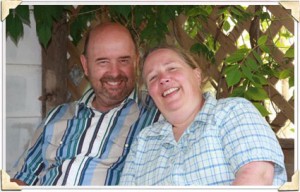West Concord, MN
This month, guest contributor Ken Meter talks with Alan and Lori Callister about fresh free-range poultry, knowing where your food comes from, and growing the good food movement through on-farm processing. Ken is president of Minneapolis-based Crossroads Resource Center, a Farm Aid-funded group. He works with 39 local foods initiatives in 19 states, studying local farm and food systems with a focus on economics.
If you lived in Minnesota, you might turn to Alan and Lori Callister for a fresh, wholesome Thanksgiving turkey – because you would know a great deal about how your turkey moved from farm to table. The Callisters farm in Dodge County, 65 miles south of Minneapolis-St. Paul. Yet they also process poultry at a commercial scale, right on their farm. Until recently, they operated a retail outlet in Minneapolis.
Lori says the importance of knowing the source of your food was instilled by her father as she grew up in southeast Minnesota. “My dad was adamant about not buying meat when you didn’t know where it came from,” she recalls. “We never bought margarine. We never bought fast food,” Callister adds. “We always gardened. We moved a lot, and that meant starting gardens again and again. We never had much money, but we always had good food.”
So it was quite a natural step when Alan and Lori began to raise chickens and turkeys. At first, they just sold a few to their neighbors. But the response was strong, so they took their poultry to the St. Paul Farmers Market. “We didn’t realize how popular our fresh chickens would become,” she says. “People are rediscovering how wonderful food can be.”
The Callisters call their poultry “modified free range.” Their chickens and turkeys roam pastures in the warmer months, but are confined when it gets cold. This protects the birds from coyotes, raccoons, and other predators, but also reduces the pain of providing fresh water during freezing conditions. They use no medications, nor antibiotics or animal byproducts in their feed.
They credit Mike Lorentz, of Lorentz Meat Processing in Cannon Falls, with encouraging them to start processing poultry raised by other producers in their on-farm processing plant. When a local certified USDA processor closed this spring, Lori recalls she had a long talk with Mike. “People had no place close to them with USDA inspection,” Lori says. “Mike knew what to say at just the time I was ready to hear it. He said, if you really want to support local food and local producers, why not process birds for other farmers?”
After constructing their plant in 1999, they now process about 1,000 chickens each week, and hire the equivalent of 6 full-time people. While they raise a few turkeys for summer processing, almost all of them are grown for Thanksgiving. Come mid-November, the Callisters process about 800 of their own turkeys and about 800 turkeys for numerous other farmers.
Previously, an indoor marketplace in Minneapolis had approached the Callisters, suggesting they open a retail meat counter. “It took us a year to figure out how it was going to work, especially fitting in the workload to the demands of our farm,” she adds. Still, she knew there was a need for such a store. “Not everyone can buy at the farmers’ market. I knew there was a place for a seven-day market.” Yet, she adds, she was fearful of the hours required. Indeed, their first partner left because it took too much time — and the Callisters themselves suspended operation of the store this fall so they could devote their full attention to raising chickens and processing poultry.
Lori says they felt totally welcomed in South Minneapolis. A middle-income community, it has the feel of a small town. “We knew people by their first names. Our customers were amazed that they could walk in and get their questions answered,” unlike many retail stores. Although they couldn’t make the store work for them, Lori is even more positive that the concept and the time are right for the idea.
In addition to selling at the farmers market, the Callisters supply two metro restaurants, a cooperative grocery, and Carleton College.
The Callister’s vision is very much rooted in their day-to-day lives. “Farmers need to link with consumers,” Lori says. “A lot of our neighbors simply produce commodities. They don’t understand they also have to link to people.”



